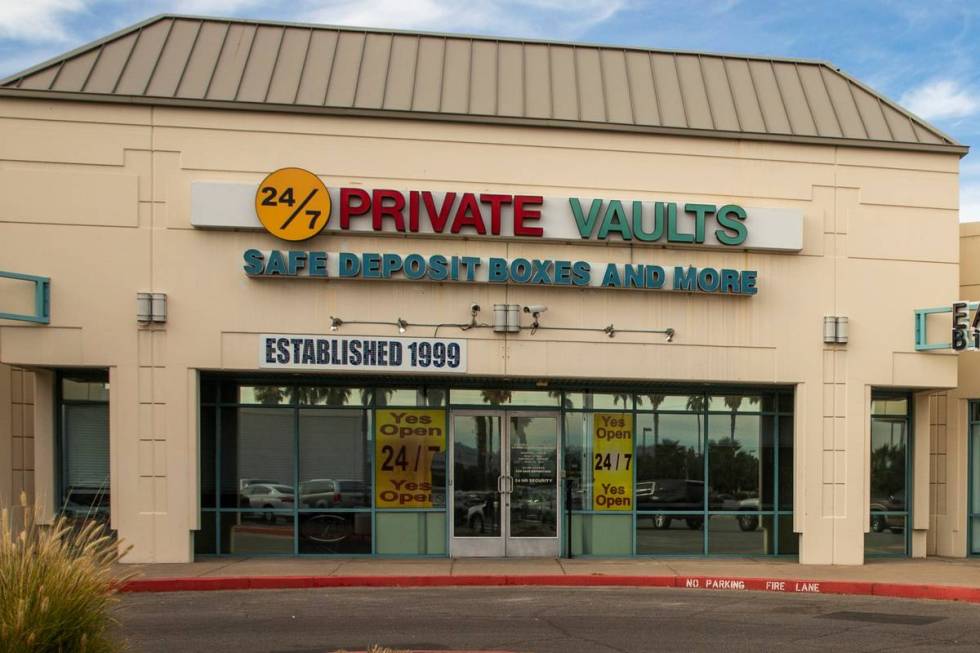Jury to decide whether break-ins at Las Vegas vault were inside jobs

A Las Vegas jury began deliberations Monday afternoon in a federal trial that centered around a robbery and burglary at 24/7 Private Vaults.
“This is not a case about old Vegas, when cash and Elvis were king,” Assistant U.S. Attorney Mina Chang said in the trial’s closing arguments. “This case is about three former workers, two break-ins of the business and over $1 million in subsequent financial transactions.”
The weeklong trial stemmed from a 2012 robbery and a 2014 burglary. The latter occurred soon after the company had filed for bankruptcy.
Prosecutors argued that both crimes were inside jobs.
They filed charges against former employees Sylviane Della Whitmore and Larry Anthony McDaniel and security consultant Phillip D. Hurbace on April 11, 2017, several days before the five-year statute of limitations for the robbery ran out.
The insiders knew when only one security guard would be on shift, Assistant U.S. Attorney Tony Lopez said. They also knew how to circumvent the security and enter the vault through the ceiling. And they knew the business was closed in 2014.
“You know that it’s empty,” Lopez said. “You know that it’s a sitting duck.”
Hurbace, who did some work for the company, and Whitmore are charged in a 32-count federal indictment with planning and carrying out the robbery with other unknown suspects.
They also face felony counts of money laundering and interstate transportation of stolen property. McDaniel is not charged with the robbery but faces money laundering and stolen property counts.
“They knew how to get around the security measures, and they took advantage of perfect victims,” Chang said. “Ones that would not come forward even after they were stolen from.”
False security
Elliot Shaikin, the late founder of 24/7 Private Vaults, touted the business as safer than banks.
Clients had keys to safe deposit boxes, used an iris scan to access the vault and signed paperwork with an “X” to keep their identities secret. Up to $70 million in cash and valuables were stored there.
Shaikin called himself “Mr. Elliot” and usually was seen wearing brightly colored suspenders. He promised a lollipop to anyone who toured his facility.
“It seems like he may have given them suckers because that’s how he treated them,” defense attorney Kendall Stone told the jury Monday.
Because the promises of around-the-clock monitoring by armed guards, with even protections on the roof, didn’t exist, according to testimony.
Prosecutors connected the defendants to cash purchases, bank statements and Hurbace’s knowledge about bypassing the security cameras.
Stone argued that Hurbace used his own money and money he borrowed from his ex-wife to buy a home in California. He had kept his money in safes all his life. Plus, she argued, the security guard that night described three young men and a woman on a walkie-talkie.
“Cash isn’t illegal,” defense attorney Kendall Stone said. “What the government is using to fuel their fantasy is the hope that you’ve seen large amounts of cash and decide, ‘something about that must be illegal.’ ”
Todd Leventhal, who is defending McDaniel, called the case nothing but “speculation and innuendo” and said prosecutors didn’t prove where the money came from.
Robert Draskovich, who represents Whitmore, also maintained his client’s innocence.
“There was a robbery. There was a break-in. There were deposits,” he said. “And they’re asking you to convict that woman based on those three things and those three things alone.”
Jurors are scheduled to resume their deliberations Tuesday morning.
Contact Briana Erickson at berickson@reviewjournal.com or 702-387-5244. Follow @ByBrianaE on Twitter.